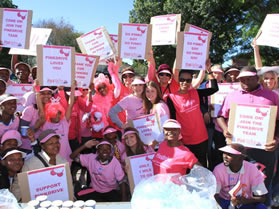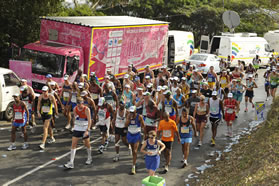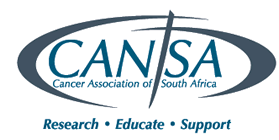Breast cancer can be beaten
Breast cancer can be beaten Estelle GreeffAdvice and Events
October is Breast Cancer Awareness Month. Breast cancer is the most common cancer in women worldwide and affects one in 29 women in South Africa. But it does not have to be a death sentence especially if it is detected and treated in time.
 Making strides in the prevention and awareness of breast cancer is the PinkDrive campaign and the Cancer Association of South Africa (CANSA). The PinkDrive was tarted by the non-profit organisation Cause Marketing Fundraisers.
Making strides in the prevention and awareness of breast cancer is the PinkDrive campaign and the Cancer Association of South Africa (CANSA). The PinkDrive was tarted by the non-profit organisation Cause Marketing Fundraisers.
Supported by the Department of Heath, the PinkDrive is committed to improving breast cancer awareness, education, and providing and offering services to women across South Africa, particularly to those who do not have access to information on breast health.
Communities
The Pink Drive currently has two mobile breast units working in four provincial hospitals in Gauteng, serving some 1,6 million women.
 They aim to provide affordable, convenient mammography services to women in the private and corporate sectors; and provide free scanning and education to disadvantaged communities via local clinics, community health centres and specified hospitals with no oncology facilities.
They aim to provide affordable, convenient mammography services to women in the private and corporate sectors; and provide free scanning and education to disadvantaged communities via local clinics, community health centres and specified hospitals with no oncology facilities.
In the past year the campaign has conducted 2012 mammograms, 16 244 clinical breast examinations and has educated over 20 000 and counting women on breast cancer.
Early detection
If detected early, there are more treatment options for breast cancer and a better chance of survival.
 Breast cancer is usually detected by a lump in the breast. Many breast lumps are not-cancerous or life-threatening, but some can increase the risk of breast cancer. Men also get breast cancer, which can occur at any age, but older men are more at risk. Should you come across a lump on your breast, consult your clinic or doctor immediately.
Breast cancer is usually detected by a lump in the breast. Many breast lumps are not-cancerous or life-threatening, but some can increase the risk of breast cancer. Men also get breast cancer, which can occur at any age, but older men are more at risk. Should you come across a lump on your breast, consult your clinic or doctor immediately.
What are the symptoms of breast cancer?
 Early breast cancer usually doesn’t show symptoms, but as the tumour grows, it can change how the breast looks or feels. Signs of breast cancer include:
Early breast cancer usually doesn’t show symptoms, but as the tumour grows, it can change how the breast looks or feels. Signs of breast cancer include:
- a change in the shape or size of the breast
- a lump or thickening in or near the breast or in the armpit area
- dimpling in the skin of the breast
- the nipple turning inward into the breast
- unexpected, abnormal discharge of fluid from the nipple
- a change in the colour or feel of the skin of the breast or around the nipple
- swelling, redness or a feeling of ‘heat’ in the breast.
Breast examination
Remember, even if you feel healthy now, just being a woman and getting older puts you at risk of getting breast cancer.
Getting checked regularly can put your mind at ease. Know how your breasts normally look and feel and report changes to your doctor right away. Do a breast self-examination at least once every month.
Breast Self-Examination is as easy as 1-2-3
- In the mirror
In front of a mirror, check for any changes in the normal look and feel of your breasts, such as dimpling, size difference or nipple discharge. Inspect four ways: arms at sides; arms overhead; firmly pressing hands on hips and bending forward.
- Lying down
Lie on your back with a pillow under your right shoulder and your right hand under your head. With the three middle fingers of your left hand make small circular motions, follow an up and down pattern over the entire breast area, under the arms and up to the shoulder bone, pressing firmly. Repeat using right hand on left breast.
- While bathing
With your right arm raised, check your right breast with a soapy left hand and fingers flat using the method described under “Lying down”. Repeat on the other side.
Do a self breast-examination every month seven to 10 days after your period every month.